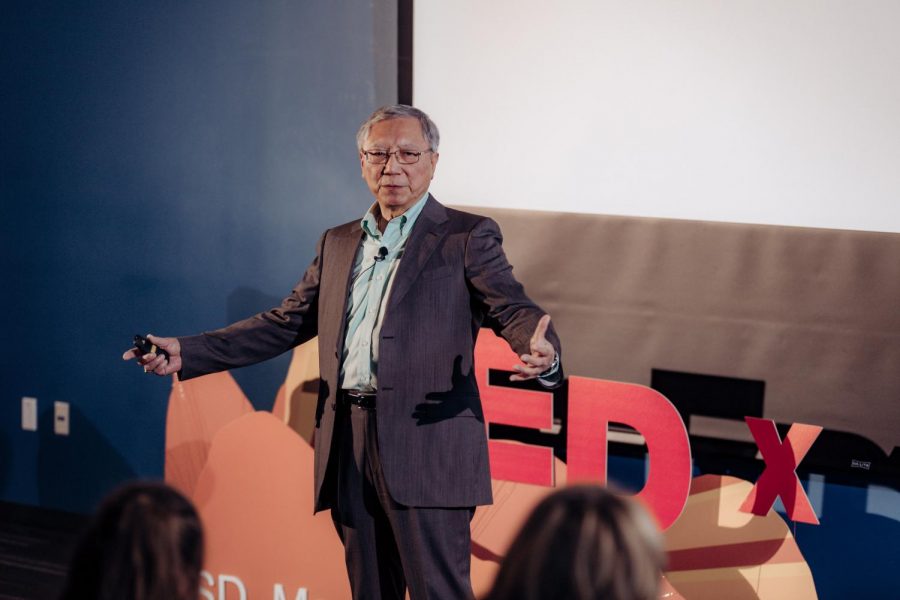San Diego Mesa College brought TEDx to campus on April 25 to spread ideas of how we can become a better species.
This year’s theme was “Making Machiavelli Weep: Human Inclusion and Progression.” With Niccolò Machiavelli, a 15th century political philosopher who believed humans are inherently evil, TEDx speakers from all over the globe came together to show him what’s right in the world with inspiring speeches. This year was Mesa College’s second year bringing TEDx to campus. TED, or Technology, Entertainment, and Design, is an international conference that shows exciting new technology and developments that makes the world a better place. A TEDx is an independently run TED talk. In room MC-211 A/B, ideas were shared on how to make the world a better place. The conference had a singer, a biological scientist, professors, book publishers and students as speakers.
Albert Cruz is a professor and the author of “Becoming Who You Want To Be.” When Cruz took the stage, his talk was about how to make life more colorful and meaningful. According to Cruz, the average lifespan of a human is 30,000 days. He wants to teach people how to keep control of their life with goal setting. He states when creating goals to think of how, when, what and why. Making goals and sticking to them can be difficult for a lot of people. Ever made a goal but then procrastinated and never looked back again? Cruz talked about how to fix that mindset. He lives his life by making specific, meaningful goals for himself. 13 years after his retirement, Cruz obtained a Bachelor’s degree, two master degrees and a PHD. Now at age 73, Cruz is starting to learn how to play the piano.
The next speaker, Eduardo Moncada, is a student at San Diego Mesa College and an advocate for tuition-free public college. He says college used to be “the golden ticket to the train to middle class.” Now college is for the privileged or creates a lifetime debt and stress. He says it “puts an uphill battle for the rest of your life.” When the student is independent they might have to have multiple part-time jobs or a full time job, which takes away from on-campus activities.
According to Moncada, housing costs have gone up 1000% since 1977 and it’s at an all-time high. Moncada spoke about the unfairness of modern college debt. “It’s time for the United States of America to stop treating this like a business.” Getting out of college then immediately being stuck with thousands of dollars in debt doesn’t allow them to be an active participant in the economy. Instead of being able to start a business or put a down payment on a home, they’re worrying about interest of their student loan. According to Moncada, college graduates have better health, so less money is being spent on healthcare. They’re also less likely to commit crimes which is less money being spent on incarceration.
Nicole Matthews is the author of “Permission!: Stop Competing and Start Creating the Life You Want to Live.” Her talk was titled “The other F-Word – will it define your path?” Here, “F-Word” meaning “fine.” She says when people answer fine it ends the conversation and tells nothing about how they feel. She wants everyone to move past a place of being fine.
Matthews also talked about the “Happy Maps” app. Instead of just taking the fastest route, it gives the options to take a happier or a more quiet route. Life isn’t about being fine or being the most efficient, it’s also about enjoying. She encourages to learn to take the path that takes a little longer but allows people to see geese swimming and kids laughing. “You are the person that’s going to figure out how to live your best life” she says.
The last speaker brought the discussion outside of talking about how to be a better person. Dr. James Niehs is a Biological Scientist and a professor at UCSD. His talk was titled “Bees & Us: An Ancient and Future Symbiosis.” He started off with a picture on the projector screen of bees communicating. Bees are social bugs that talk, dance and tell each other where to go to pollinate. According to Niehs, the history of bees goes back thousands of years. Niehs says without bees we’d lose out on high levels of nutrition. Bees contribute to agriculture and have a role on 33% of our crops. Bees have been dying at a rapid rate and scientists finally know why: Varroa Destructor disease, beekeeping practices, poor nutrition, pesticides and other diseases. Believe it or not, bees have an immune system and need a diverse amount of food. Niehs says “we cannot keep throwing chemicals at our problems.” His research focuses on activating bees’ natural immune system with vaccines instead of using more chemicals.
The TEDx speakers want to teach people how to enjoy life, slow down to smell the flowers and thank the bees.


